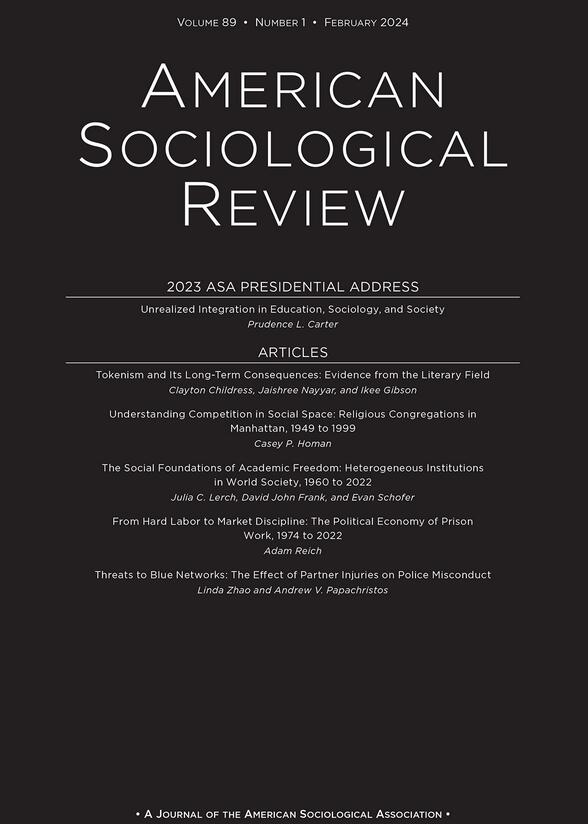学校教育能减少早期成就的社会经济不平等吗?差分曝光法
IF 6.2
1区 社会学
Q1 SOCIOLOGY
引用次数: 12
摘要
学校教育是否影响教育成就方面的社会经济不平等?早期基于季节性比较的研究表明,学校教育可以弥补学习中的社会差距。然而,最近的复制研究引起了人们对旧发现有效性的怀疑。我们通过估计德国社会经济家庭背景对一年级教育对成绩不平等的因果影响,为这场辩论提供了新的线索。我们详细阐述了一种差异暴露方法,该方法通过(有条件地)利用在同一日历日入学的儿童的考试日期和出生日期的随机变化来估计暴露于一年级教育的影响。我们使用德国NEPS的最新数据来测试一系列学习领域的学校暴露效应。研究结果清楚地表明,一年级的教育提高了儿童在各个领域的学习。然而,我们没有发现任何证据表明这些受教育的影响因儿童的社会经济背景而异。我们得出的结论是,尽管所有儿童都从学校教育中受益,但学校教育对学习中的社会不平等没有任何影响。我们讨论了我们的研究结果与社会学知识在分层过程中的作用的相关性,并强调了我们的方法如何补充季节性比较研究。本文章由计算机程序翻译,如有差异,请以英文原文为准。
Does Schooling Decrease Socioeconomic Inequality in Early Achievement? A Differential Exposure Approach
Does schooling affect socioeconomic inequality in educational achievement? Earlier studies based on seasonal comparisons suggest schooling can equalize social gaps in learning. Yet recent replication studies have given rise to skepticism about the validity of older findings. We shed new light on the debate by estimating the causal effect of 1st-grade schooling on achievement inequality by socioeconomic family background in Germany. We elaborate a differential exposure approach that estimates the effect of exposure to 1st-grade schooling by exploiting (conditionally) random variation in test dates and birth dates for children who entered school on the same calendar day. We use recent data from the German NEPS to test school-exposure effects for a series of learning domains. Findings clearly indicate that 1st-grade schooling increases children’s learning in all domains. However, we do not find any evidence that these schooling effects differ by children’s socioeconomic background. We conclude that, although all children gain from schooling, schooling has no consequences for social inequality in learning. We discuss the relevance of our findings for sociological knowledge on the role of schooling in the process of stratification and highlight how our approach complements seasonal comparison studies.
求助全文
通过发布文献求助,成功后即可免费获取论文全文。
去求助
来源期刊

American Sociological Review
SOCIOLOGY-
CiteScore
13.30
自引率
3.30%
发文量
35
期刊介绍:
The American Sociological Association (ASA) is a non-profit membership association established in 1905. Its mission is to advance sociology as a scientific discipline and profession that serves the public good. ASA is comprised of approximately 12,000 members including faculty members, researchers, practitioners, and students in the field of sociology. Roughly 20% of the members work in government, business, or non-profit organizations.
One of ASA's primary endeavors is the publication and dissemination of important sociological research. To this end, they founded the American Sociological Review (ASR) in 1936. ASR is the flagship journal of the association and publishes original works that are of general interest and contribute to the advancement of sociology. The journal seeks to publish new theoretical developments, research results that enhance our understanding of fundamental social processes, and significant methodological innovations. ASR welcomes submissions from all areas of sociology, placing an emphasis on exceptional quality.
Aside from ASR, ASA also publishes 14 professional journals and magazines. Additionally, they organize an annual meeting that attracts over 6,000 participants. ASA's membership consists of scholars, professionals, and students dedicated to the study and application of sociology in various domains of society.
 求助内容:
求助内容: 应助结果提醒方式:
应助结果提醒方式:


